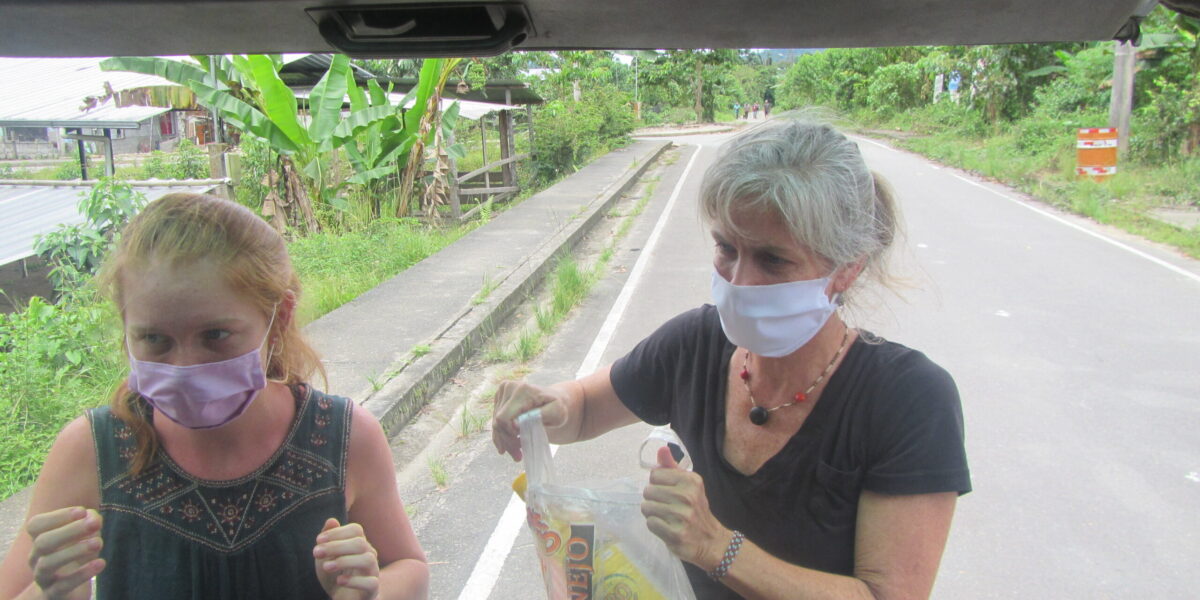Editor’s note: In some parts of Ecuador, especially Guayaquil, COVID-19 is claiming many lives. Throughout the country, the quédate en casa (stay at home) orders have grave repercussions for people who live day-to-day and don’t have money to buy food when they can’t go to work. In this blog, Jerrell Ross Richer shares their family’s story of sharing food with neighbors near their home in Tena. They are mission workers for Mennonite Mission Network in the Ecuadorian rain forest, where they walk alongside indigenous church leaders.
Apr. 4, we headed for downtown Tena and purchased relief food for our neighbors in Mushuk Kawsai ("New Life" in Kichwa). The neighborhood is a government housing project, a series of two-story concrete homes built on one side of the street. The houses were given to families who lost their homes and land when the government built a road to access the new university, Ikiam, just a kilometer west of here. We had already taken food to Jaime and Maria’s family, so we made our Apr. 4 distribution to 12 more families. Each of these 12 families received a 10-pound bag of rice, four pounds of lentils, two cans of sardines, oil, salt and seasoning. We wrote a note in Spanish with the last phrase in Kichwa to include with each bag of food.
Translated into English, the note read:
Neighbors,
Mennonite Mission Network has donated funds to help out during this crisis. We hope this will be a blessing to you.
Walking together we can overcome this! We are in God’s hands.
God bless you!
Peace,
The Ross Richer Family
We were not sure what to expect once we began to deliver the food to each house in the neighborhood. We had never done this before and were uncertain how our indigenous Kichwa-speaking neighbors would react to the gift of food under these unprecedented circumstances. We know that some families have a garden or farm in a different location where they cultivate cassava and plantains, but that they typically supplement their diet with other foods rich in protein and vitamins. The forest near here has long been depleted of game, and the rivers have been over-fished as the population expands. During this crisis, people are unable to work to earn the money they need to buy meat, eggs or beans. We trusted that a bag of lentils, two cans of sardines and a large bag of rice, oil and seasoning would be welcome. We suspect that for some families it may be about all they have to eat for a while.
Rice, lentils, sardines, oil, salt and seasonings were shared with 12 Kichwa families in the Mushuk Kawsai Neighborhood of Tena. A note explained the gift, while noting we are walking together in God’s hands. Photo by Jordan Ross Richer.
We parked and opened the tailgate of our 1995 Land Cruiser. Naomi hoisted the 10-pound bags of rice while Jane carried the bags stuffed with lentils and oil and the rest. They approached the first house slowly, and as several occupants emerged from their house into the yard, explained that the food was a gift for their family. Soon others emerged from their homes next door to see what was going on. I slowly moved our vehicle up the street, from house to house, while Jane and Naomi greeted the occupants with bags of food.
We then made two more stops on our way home: at the home of a new family who just built a house across the road from ours, and at the home of a family we have known since we first arrived here in 2015. Lourdes is a single mother with five children, and Jane and Naomi encountered one of them, Yamilé, as they walked up their trail to their home. We have only seen Yamile once during these last three weeks of quarantine, and she smiled brightly as they handed her the provisions.
We reached our farmhouse just before 2 p.m., when curfew begins, feeling satisfied that we had been helpful to our neighbors after spending so much time cooped up at home. As frustrating as it is not to be able to talk with people in person, we trust that these modest gifts of rice and lentils tangibly show that we care for them.
With God, everything is possible.








